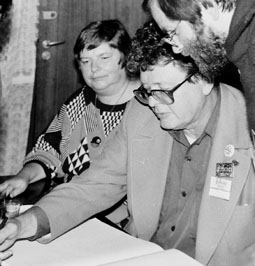„Jeden człowiek nie może zmienić historii.”
Postać: Thornberg
Sam Hall
Poul William Anderson – amerykański pisarz science fiction i fantasy.
Używał pseudonimów A.A. Craig, Michael Karegeorge, Winston P. Sanders.
Jego rodzice pochodzili z Danii, ojciec nosił nazwisko Andersen, ale w czasie służby wojskowej w czasie I wojny światowej zmienił na bardziej anglosaskie „Anderson”. Przez krótki okres swojego życia, po śmierci ojca, Poul mieszkał z matką w Danii. Rodzina wróciła do Stanów po wybuchu II wojny światowej.
Wychował się w Teksasie i Minnesocie. W roku 1948 ukończył fizykę na Uniwersytecie Minnesota. Interesował się również historią, językiem i literaturą rodzinnego kraju rodziców. Wiedzę tę wykorzystał później w swojej książkach. Poruszał się swobodnie zarówno w tak zwanej twardej fantastyce, jak i w fantasy.
Jego córka, Astrid, wyszła za mąż za znanego pisarza s-f Grega Beara.
Debiut literacki Andersona to opowiadanie napisane wspólnie z F.N. Waldropem Tomorrow’s Children w 1947. Był członkiem Fantasy Society w Minneapolis, gdzie początkowo mieszkał. W 1952 roku wydał pierwszą powieść Vault of the Ages. Był redaktorem i wydawcą wielu książek.
Był szóstym przewodniczącym Science Fiction and Fantasy Writers of America, przejmując urząd w 1972.
Zmarł na raka 31 lipca 2001 po miesięcznym pobycie w szpitalu.
Wikipedia

„Jeden człowiek nie może zmienić historii.”
Postać: Thornberg
Sam Hall
Now I killed a man they said
So they said, so they said
Oh I killed a man they said
Yes they said
I killed a man they said
And I left him layin dead
Cause I bashed his bloody head
Blast his eyes. (ang.)
Sam Hall
Źródło: Sam Hall, ludowa piosenka angielska
“On our Earth, we’ve perforce learned all the knavery there is to know.”
Źródło: The High Crusade (1960), p. 131
Poul Anderson: Fifty Years of Science Fiction (1997)
“Men, whose span is cruelly short, rush nonetheless to death in their youth as to a maiden’s arms.”
Źródło: The Broken Sword (1954), Chapter 10 (p. 55)
Źródło: Harvest of Stars (1993), Ch. 55
Poul Anderson: Fifty Years of Science Fiction (1997)
“You know what they say about bold spacemen never becoming old spacemen.”
"Garden in the Void" (1952)
Short fiction
“You should pay no heed to what some yokel priest has prated of. What does he know?”
Źródło: The Broken Sword (1954), Chapter 11 (p. 70)
Źródło: There Will Be Time (1972), Chapter 16 (p. 176; closing words)
Section 2 “Arsenal Port”, Chapter III (p. 90)
The Star Fox (1965)
“We live with our archetypes, but can we live in them?”
"The Fatal Fulfillment" (Short Story), March 1970. Originally published in The Magazine of Fantasy and Science Fiction
Short fiction
Ivory, and Apes, and Peacocks (p. 314)
Time Patrol
“Man does not live by bread alone, nor guns, paperwork, theses, naked practicalities.”
Gibraltar Falls (p. 118)
Time Patrol
Wariant: Bombing: A method of warfare which delivers high explosives from the air, condemned because of its effects upon women, children, the aged, the sick, and other non-combatants, unless these happen to have resided in Berlin, Hamburg, Dresden, Tokyo, Osaka, etc., though not Hiroshima or Nagasaki. Cf. missile.
Źródło: There Will Be Time (1972), Chapter 3 (p. 30)
Źródło: Three Hearts and Three Lions (1961), Chapter 17 (p. 162)
“I think most human misery is due to well-meaning fanatics like him.”
Time Patrol (p. 42)
Time Patrol
“Too far a retreat from reality is insanity.”
Źródło: Brain Wave (1954), Chapter 10 (p. 82)
Źródło: Three Hearts and Three Lions (1961), Chapter 10 (p. 88)
Źródło: Three Hearts and Three Lions (1961), Chapter 7 (p. 64)
Źródło: Three Hearts and Three Lions (1961), Chapter 12 (p. 102)